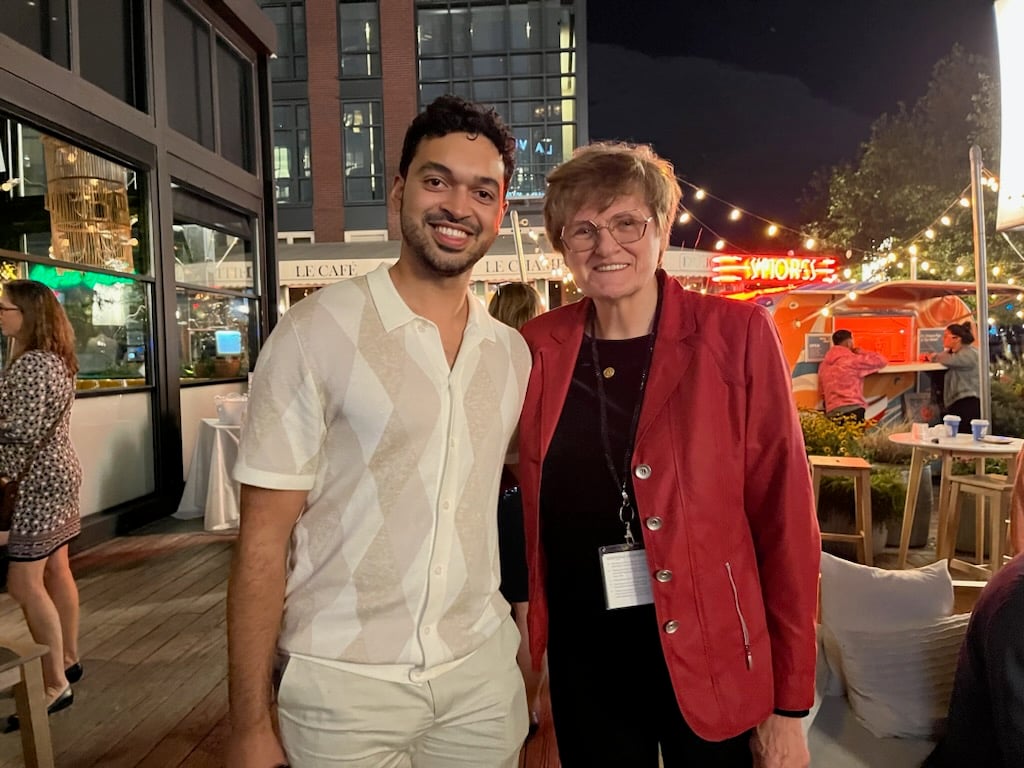Pitt startup Astria Biosciences continues to rack up milestones as it works to bring the first simple, whole blood-based test to detect the presence and monitor the progression of cerebral aneurysms to market.
It’s latest accomplishment: receiving a $275,000 SBIR Phase 1 commercialization grant from the National Science Foundation (NSF). The grant will be applied toward developing a robust data set with a focus on minorities to provide higher test fidelity in high-risk and under-represented patient groups and developing a dynamic rupture risk score that can be used to define novel aneurysm sub-groupings.
The company was founded by Kamil Nowicki, who recently completed a residency and fellowship in the University of Pittsburgh School of Medicine Department of Neurosurgery before accepting a fellowship at Yale University’s New Haven Hospital, and Adi Mittal, a student at the Pitt School of Medicine.

Pitt School of Medicine student Adi Mittal meets Katalin Kariko, winner of the 2023 Nobel Prize for Medicine, at the National Collegiate Inventor's Competition.
“Adi and I spent many countless nights and weekends polishing the (SBIR) application, Nowicki said. “We thought we had an inspiring story, compelling data and a strong application, but we didn't imagine we'd get the maximum amount for phase I funding, so we are very excited.”
He added, “Throughout this whole process, we've been advised and mentored by the top gun team at Pitt's Innovation Institute led by Dan Broderick, Tony Torres, and Paul Petrovich. We've also been supported and mentored by Rhonda Schuldt and David Toth from Pitt's Big Idea Center.”
Aneurysms develop when the wall of an artery in the brain weakens and balloons outward. When this occurs, the walls can leak or rupture at any time, almost half of the time leading to death, and leaving many who survive with lifelong disabilities. Current methods of diagnosing aneurysms are costly and invasive, such as a cerebral angiography or spinal tap.
Mittal and Nowicki, working in the lab of Robert Friedlander, chair of the Department of Neurological Surgery, are developing CAT-7, a protein-based blood panel of several cytokines that screen in lab tests to a 95 percent sensitivity for aneurysms and can predict the risk of rupture.
“It has been a pleasure to work with Kamil and Adi as they have accelerated on their commercialization path,” said Broderick, entrepreneur in residence at the University of Pittsburgh Innovation Institute, part of the Office of Innovation and Entrepreneurship.
“They began by focusing on a problem – the costly and cumbersome process of diagnosing aneurysms – and in developing their solution they have sought out nearly every resource available to them through the Pitt innovation and entrepreneurship ecosystem.”
Nowicki and Mittal’s commercialization journey began in the NSF I-Corps program, where teams interview potential customers to find what their pain points and unmet needs are and begin to fashion a value proposition for solving those problems.
Mittal then competed in the Randall Family Big Idea Competition at the Big Idea Center, the university’s hub for student innovation and entrepreneurship, taking a second-place prize.
They followed that by competing in the Innovation Institute’s Michael G. Wells Student Healthcare Competition, initially in 2021 but didn’t win a prize. After re-calibrating their approach to focus solely on a diagnostic product, they won the top prize.
Most recently, Nowicki received the Academy Award from the American Academy of Neurological Surgery for the research and intellectual property licensed by Astria. And in October the research team supervised by Dr. Daniel Wecht won $100,000 in the Pitt Innovation Challenge (PInCh) 2023 to further define sex-based differences and narrow down the discrepancies that make women more susceptible to aneurysm formation. This award will also explore the role of aging and age-related cytokines in aneurysm formation.
Then on October 24, Mittal won first place in the graduate category at the National Collegiate Inventors' Competition.
“This all culminated this week with the NSF SBIR Phase I award, which was probably the strongest endorsement that we've received so far. In short, the award will ensure our startup's success by de-risking the technology and accelerating the process to bring our inventions from bench to patients' bedside," said Nowicki.
If you are a Pitt innovator interested in starting your own commercialization journey, a great place to begin is with an NSF I-Corps short course -- a month-long virtual (or hybrid) course where you interview potential customers to understand their unmet needs and how your innovation can help them solve their problems.